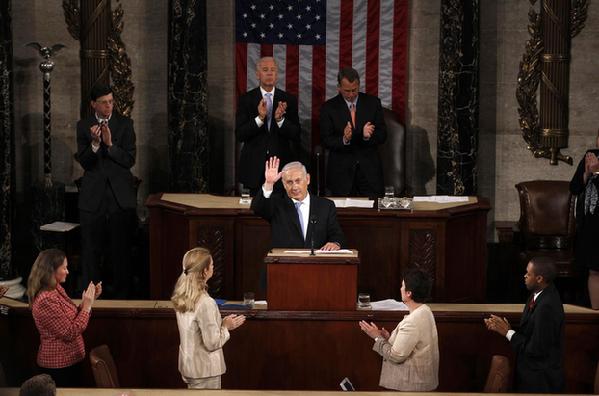Politics
Netanyahu says will give up some land for peace
Updated: 2011-05-25 09:16
(Agencies)
WASHINGTON - Israeli Prime Minister Benjamin Netanyahu said explicitly for the first time on Tuesday he was prepared to give up some settlements for peace, but he laid out familiar demands unlikely to draw the Palestinians back to the negotiating table.
 |
|
Israel's Prime Minister Benjamin Netanyahu reacts to a standing ovation after addressing a joint meeting of Congress in Washington, May 24, 2011. [Photo/Agencies] |
Treated to standing ovations from US lawmakers just days after strained talks with President Barack Obama, Netanyahu said he was ready for "painful compromises." But Palestinians swiftly rejected his list of conditions as unacceptable.
|
||||
Though Netanyahu recognized in the clearest terms yet that Israel would have to abandon some Jewish settlements built in the occupied West Bank, he also insisted that others would be annexed under any future agreement.
"I am willing to make painful compromises to achieve this historical peace," he said, echoing a pledge in a speech to Israel's parliament on May 15 in which he hinted at a readiness for territorial compromise but with strings attached.
"Now this is not easy for me. It's not easy because I recognize that in a genuine peace we will be required to give up parts of the ancestral Jewish homeland," he said, referring to the occupied West Bank.
But Netanyahu offered no concrete concessions and instead set strict limits on what Israel would accept.
His frequent standing ovations from the joint meeting of Congress, a bastion of support for Israel, was a pointed message to Obama that pushing Israel too hard could carry political risks as he seeks re-election in 2012.

Netanyahu's speech came after a testy exchange last week with Obama over the contours of a future Palestine and Netanyahu used it to reiterate his demands ahead of any talks.
The conditions Netanyahu laid out included Palestinian recognition of Israel as the homeland of the Jewish people and the scrapping of Western-backed Palestinian President Mahmoud Abbas' unity accord with the Islamist movement Hamas.
But in an explicit recognition of what a peace deal would entail, he said: "In any peace agreement that ends the conflict, some settlements will end up beyond Israel's borders. The precise delineation of those borders must be negotiated."
While Netanyahu was well aware Palestinians were opposed to his terms, he hopes to show the United States and Europe he is serious as Israel seeks to head off a Palestinian bid to win UN recognition of statehood in September.
Specials

Suzhou: Heaven on Earth
Time-tested adages sing praises of Suzhou, and Michael Paul Franklin finds it's not hard to understand why on a recent visit.

The sky's the limit
Chinese airline companies are increasingly recruiting pilots and flight attendants as the industry experiences rapid expansion.

Diving into history
China's richest cultural heritage may lie in the deep, like exhibits in a giant underwater museum.


